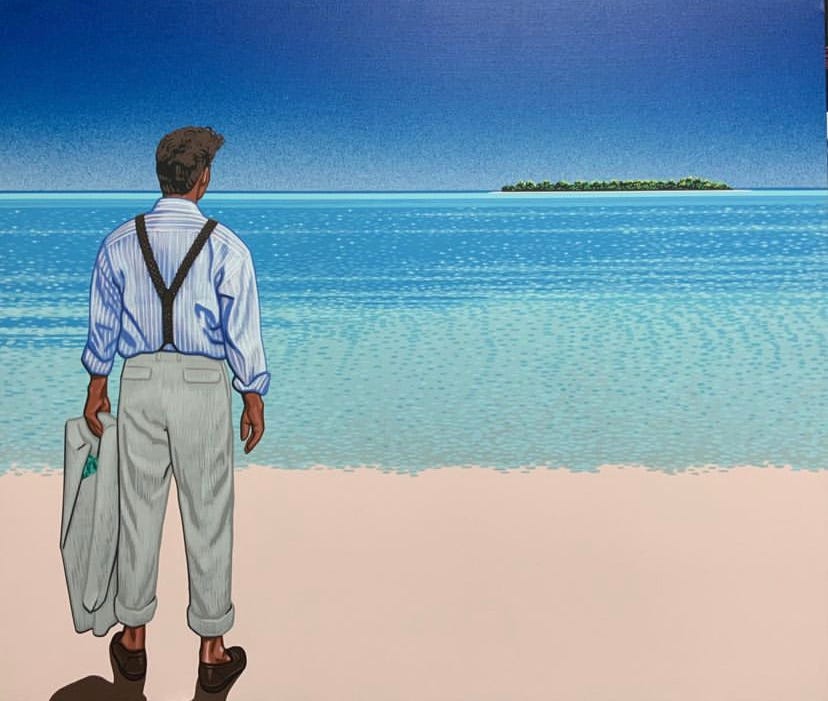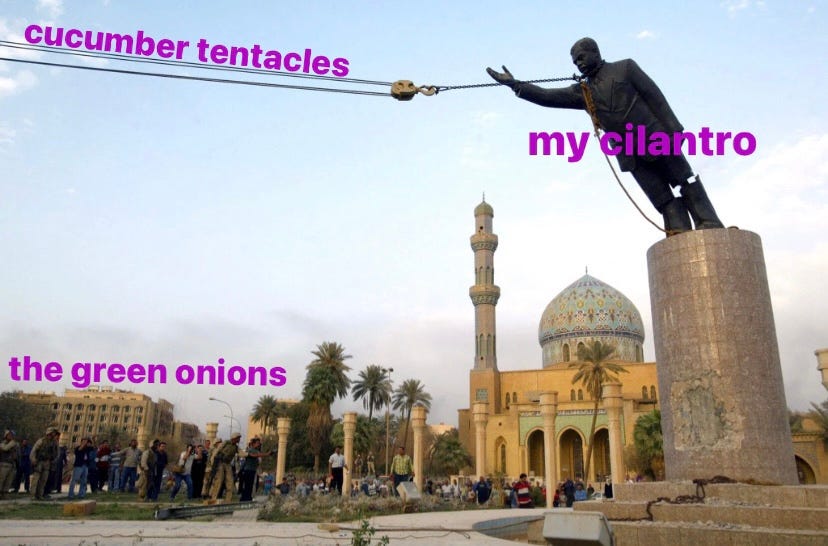cucumbers vs. saddam hussein
June 29, 2021
Welcome to Reality Farm.
Lost? Confused? Excellent, me too. Here’s a map.
SUGAR CUBES 📷
Hiroshi Nagai — Waves
Hiroshi Nagai — Portrait
Hiroshi Nagai — Architecture
WEATHER REPORT 🖼
I have given up my garden to the cucumber. Nothing else I planted has grown with even half the cucumber’s enthusiasm. I often do not know what to do with my garden and I am troubled by what to plant, when to plant it, whom to prune, and whom to favor. Not so for the cucumber. The cucumber knows exactly what to do: “I will grow three inches a day,” it thinks, “I will consume this pathetic country, from the redwood forest to the Gulf Stream waters.” The vines cover my entire plot, spreading huge leaves above my green onions and rosemary, who perish for lack of sun. My cilantro, which bolted last week, has a thick, sturdy stem, but the cucumber climbs the cilantro, wrapping tendrils around its neck and threatening to topple it like a dictator’s statue.
I should restrain the cucumber, but I won’t. It feels good to surrender all agency to a something that’s growing wildly out of control. It’s not responsible or considerate of my neighbors — all of whom eye the cucumber’s waving tentacles nervously — but it’s certainly entertaining. Watch it go!
The cucumber loves hot, full sun. With this trait alone, I wonder if cucumbers are better adapted to life on Earth than we humans are, because everywhere I look, we are withering under the hot, full sun. This heatwave is punishing. The Pacific Northwest hit some truly unbelievable numbers this week — just yesterday Portland, Oregon, reached 116 degrees, the highest temperature in recorded history. I noticed a rash of journalists traveling to some of the hottest cities in the world, in Pakistan, simply to ask the inhabitants how they cope:
“The people are used to it, they have developed a resistance,” shrugs one administration official.
The temperatures in the PNW are particularly dangerous because most homes in the area lack air conditioning. When I hear these stories, I fantasize about moving to the Arctic Circle, if only to run as far away from the heat as possible. However, if these apocalyptic levels of heat became commonplace, I wonder if it wouldn’t be more dangerous to move north, where people aren’t used to dealing with the heat, as opposed to moving south to the communities that have the infrastructure or the cultural practices to deal with the heat.
Washington, D.C., for example, is hot. Every summer. It’s hot as hell. But we know the heat is coming, so we put air conditioners in most of our buildings. That said, I sympathize with the people of Oregon, because for the past few years, I lived in a row house by the Capitol, and the worst night of my life — and I mean that in all seriousness — was last summer, around June, when our AC broke on a 95+ degree day. I went feral in the heat. I’m still recovering. The only thing that has ever come close to describing the sensation is The Sheltering Sky, by Paul Bowles, which is about two Americans who travel the Sahara in a bid to save their marriage. Wikipedia describes The Sheltering Sky as a “1949 novel of alienation and existential despair.” About 80% of that alienation and existential despair, in my opinion, is purely a result of the heat.
When it’s hot, I mean unbearably hot, heat alienates you from the body, the ill-adapted mortal shells we’re forced to lug around and cool down. When you’re trapped in the heat, you wish dearly that the heat would end, but with no end in sight and many hours of night ahead of you, you’re faced with the unforgivable nature of time and the universe. Unless, of course, you’re a cucumber. Cucumbers love that shit.
CONTENT CROP 🌾
The McAfee Central America Travel Guide || McAfee’s Blog
During my drug dealing days I became adept at those talents required of a successful drug dealer: clandestine travel through the Third World countries that produce and transport the goods; dealing with corrupt officials; dealing with drug lords and druck traffickers; successfully passing checkpoints; bribery, and in emergencies, the methods of escape.
I am a firm believer that all experience can be a valid teacher if a person listens to experience with unclogged ears. Since it is a Saturday and I’ve had a tiring week, I will take a break from the task at hand and use what little I have learned to assist travelers that might appreciate the rewards of travelling off the beaten path in third world countries. It should also assist anyone engaging in questionable activities.
note: as soon as I heard that McAfee died in a Spanish prison, I went looking for this blog post that he once wrote about how to bribe authorities in third world countries. RIP to a real one.
The War on Reality || Tablet Mag
In reality, the rushed doomsday forecasts and commitment to politically correct pseudoscience prompted leaders to abandon decades of pandemic planning. This not only had disastrous economic consequences, but it also exacerbated the effects of COVID-19 itself. And rather than swiftly correct their errors, public health officials and politicians doubled down, manipulated data, and blamed ordinary people for the failure of nonsensical policies. The uncomfortable truth is that “The Science” did not protect vulnerable populations. Instead, “expert” advice served only to make the pandemic more deadly and replace the scientific process with destructive anti-science.
note: 🌶️ 🌶️ after the feast comes the reckoning 🌶️ 🌶️
On Demons || First Things
Demons are not quite alive. They’re something like viruses, working their automatic evil—like sandstorms in their torrential, inorganic malice. As a Jew, I’m agnostic when it comes to the organized and intentional devils of Christianity. But Rav Huna’s demons are real.
. . .
Even for intellectuals (maybe especially for intellectuals), opinions aren’t really the result of a careful examination of the facts, or even a question of personal conscience. Instead, they’re mostly determined by whatever other opinions are floating around in your vicinity. Wherever you are, there’s a demon at your hand.
note: demons are real and they’re the memetic miasma that disguises other people’s beliefs and desires as our own
POSTCARDS FROM OUTER SPACE 🎴
UFOs IN THE COW FIELD 🛸
The UFO report is here:
It’s only nine pages long, so feel free to read for yourself, but here are some of the more interesting excerpts (emphasis mine):
Our analysis of the data supports the construct that if and when individual UAP incidents are resolved they will fall into one of five potential explanatory categories: airborne clutter, natural atmospheric phenomena, USG or U.S. industry developmental programs, foreign adversary systems, and a catchall “other” bin.
These reports describe incidents that occurred between 2004 and 2021, with the majority coming in the last two years as the new reporting mechanism became better known to the military aviation community. We were able to identify one reported UAP with high confidence. In that case, we identified the object as a large, deflating balloon. The other [143 cases] remain unexplained.
A Handful of UAP Appear to Demonstrate Advanced Technology: In 18 incidents, described in 21 reports, observers reported unusual UAP movement patterns or flight characteristics. Some UAP appeared to remain stationary in winds aloft, move against the wind, maneuver abruptly, or move at considerable speed, without discernable means of propulsion.
The UAPTF holds a small amount of data that appear to show UAP demonstrating acceleration or a degree of signature management. Additional rigorous analysis are necessary by multiple teams or groups of technical experts to determine the nature and validity of these data. We are conducting further analysis to determine if breakthrough technologies were demonstrated.
We currently lack data to indicate any UAP are part of a foreign collection program or indicative of a major technological advancement by a potential adversary.
THE BOOK BARN 📖
The Sheltering Sky by Paul Bowles
(Fiction, 1949. $10.)
“Death is always on the way, but the fact that you don't know when it will arrive seems to take away from the finiteness of life. It's that terrible precision that we hate so much. But because we don't know, we get to think of life as an inexhaustible well. Yet everything happens a certain number of times, and a very small number, really. How many more times will you remember a certain afternoon of your childhood, some afternoon that's so deeply a part of your being that you can't even conceive of your life without it? Perhaps four or five times more. Perhaps not even. How many more times will you watch the full moon rise? Perhaps twenty. And yet it all seems limitless.”
note: I actually resisted recommending The Sheltering Sky for some months now, but given its mention the Weather Report section, I’ll include it here with a caveat: this is a fascinating book, even spiritual in some senses, but it affected me for several days after I’d finished it — similar to my experience with Blood Meridian — where a kind of gloomy pall descends over everything. Two Americans travel to the Sahara in a bid to salvage their failing marriage. They do not succeed. Bowles, the author, was an American expat who lived throughout North Africa. He traveled into the Algerian desert, by himself, to work on the novel, saying, “I wrote in bed in hotels in the desert.” It’s all perfectly melodramatic.
update: The Brothers Karamazov progress — 175/800. Slow going this week, but the 4th of July weekend, also known as the best beach-reading weekend of the year, fast approaches.








